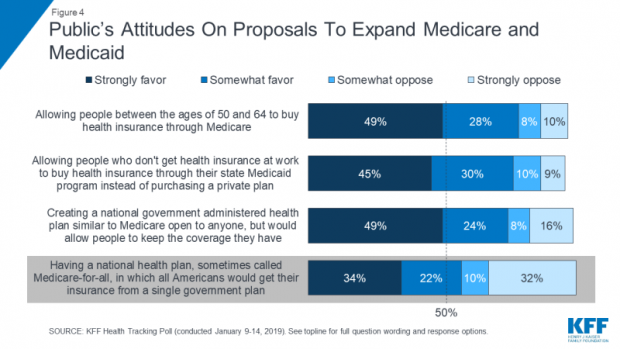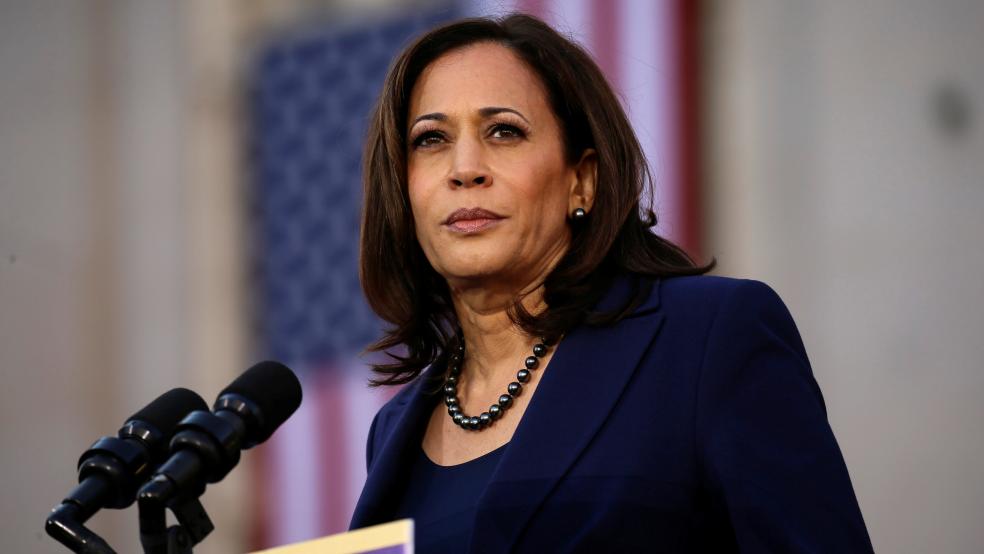The hazards Democrats face as they debate “Medicare for all” are on full display this week. California Sen. Kamala Harris, a leading contender for the 2020 Democratic presidential nomination, unleashed what CNN calls “a shockwave through the national health care debate” on Monday night when she said that she favors eliminating private health insurance as part of a shift to a single-payer “Medicare for all” system.
"Who of us has not had that situation, where you've got to wait for approval [for medical treatment] and the doctor says, well, I don't know if your insurance company is going to cover this?" Harris told CNN’s Jake Tapper during a town hall hosted by the news network. "Let's eliminate all of that. Let's move on."
Harris has co-sponsored Sen. Bernie Sanders’ single-payer plan, so her position shouldn’t have been a shock — but “her total lack of equivocation about what that legislation actually entails caught many off guard,” says New York’s Eric Levitz.
Her remarks reportedly were greeted by applause from the Drake University town hall audience — but they sparked some intense criticism outside the room, highlighting the risks Democrats face as they sort through the competing Medicare for all proposals and get pressed for details about the policies they back. “In a single flourish, Harris drew attention to the fact that the Medicare-for-all plans backed by 16 senators — including five potential candidates for the Democratic nomination — would in effect remove private health insurance from the estimated 251 million Americans who use it, broadly disrupting the industry and the way Americans experience the medical system,” The Washington Post’s Annie Linksey wrote.
The Criticisms
Republicans pounced. “Her full embrace of socialized medicine would completely eliminate your private health care plan, even if you like it,” RNC spokesman Steve Guest told Fox News.
Former Starbucks CEO Howard Schultz, on a media tour after announcing he’s considering an independent run for president, called the idea of eliminating private insurance “not American” in an interview with CBS. “What industry are we going to abolish next? The coffee industry?" he added.
Michael Bloomberg, the former mayor of New York who’s also a potential 2020 presidential candidate, dismissed Harris’s idea as unaffordable. “I think you can have ‘Medicare for all’ for people that are uncovered,” he said, “but to replace the entire private system where companies provide health care for their employees would bankrupt us for a very long time.”
The Harris camp later clarified that the senator has supported and would still be open to other plans that maintain a role for the private insurance industry but emphasized that she wasn’t backing off her position and still prefers a single-payer system. "Medicare-for-all is the plan that she believes will solve the problem and get all Americans covered. Period," Harris’s press secretary told CNN. "She has co-sponsored other pieces of legislation that she sees as a path to getting us there, but this is the plan she is running on." And another Harris spokesperson fired back at Schultz and Bloomberg on Twitter: “Attacked by billionaires for fighting to make sure every American has health care. What a shock.”
Seven Things to Know About the Dems’ ‘Medicare for All’ Fight
This Could Be a Big Litmus Test for 2020 Contenders: “What's clear from the Harris dust-up is that there doesn't appear to be much room for nuance or hedging when it comes to support (or opposition) to ‘Medicare for all,’” suggests CNN’s Chris Cillizza. “It appears to be the first sort of litmus test of liberal purity at work in the 2020 Democratic race.”
Harris Was Willing to Be Bold: Democrats sometimes tiptoe around the idea of eliminating private insurance for fear of stoking just the kind of reaction Harris got. She was willing to say it. “The left wants America to catch up with most of the developed world, where health insurance is more or less a right of citizenship and costs are still lower, and they think the best, simplest way to do it is to put everybody into one national health care plan,” Vox’s Dylan Scott says. He points out this tweet by a policy adviser to Rep. Alexandria Ocasio-Cortez: “Yes, we're going to get rid of the entire health insurance industry. That's a feature, not a bug.”
Americans Mostly Like Their Health Care: Most Americans get their health insurance through their employers, and while they may be unhappy about the high cost of health care and prescription drugs generally, polls find that most Americans are pretty satisfied with their insurance. A recent Gallup survey found that 70 percent of those with private insurance called their coverage “excellent” or good, and 85 percent rated the quality of care they receive using those terms.
And They Are Nervous About Eliminating Private Insurance: In response to Harris’s remarks, many have pointed to a recent Kaiser Family Foundation poll that found that 56 percent of Americans favor Medicare for all — but that approval rating plunged to 37 percent when respondents were asked about eliminating private health insurance companies. "The public favors these proposals that would broaden choice, but also want to be sure they don't lose something that they value," Tricia Neuman, director of the Kaiser foundation's Program on Medicare Policy, told CNN.

So Just Wait Until They Find Out What Else Is Involved in Switching to Single Payer: “For instance,” writes the Washington Examiner’s Philip Klein, “the staggering taxes that would have to be levied not just on the uber rich but also on the middle class; the massive layoffs that would result from putting a major industry out of business; the access problems that result when you're giving everybody ‘free’ healthcare while putting downward pressure on payment rates to doctors, hospitals, and other medical providers.”
Democrats Should Be Wary of the ‘Medicare for All Trap’: The New York Times’ David Leonhardt warns, Admiral Ackbar-style, that the Medicare-for-all debate is a trap, and the plan Harris supports “is an unforced error” that comes with “huge political vulnerabilities.” He notes that Brendan Nyhan, a University of Michigan political scientist, put it this way: “Even in our current politics, this proposal splits Ds and unites Rs. That's the opposite of smart politics.” Leonhardt also offers his own suggestion for the Democrats’ best answer on the Medicare for all question: “If you want Medicare, you can have it, regardless of your age. If you’d rather keep your private plan, you can do that, too. This approach will give us universal coverage, lower costs and consumer choice. Oh, and I’m in favor of tax increases on the wealthy and corporations to help pay for it. They’re not paying their fair share right now.”
But Single-Payer Systems Don’t Have to Get Rid of Private Insurance: “A role for private insurers is more the rule rather than the exception in other high-income countries,” Larry Levitt told the Los Angeles Times’ Jon Healey. But while some opponents of single payer warn that consumers would lose out on some choice if private insurers were eliminated, others argue that private insurers don’t make the system better. Dr. David Himmelstein, who advocates for a single-payer system as the cofounder of Physicians for a National Health Program, told Healey that keeping private insurers adds to the bureaucratic costs of health care without really making consumers better off.





